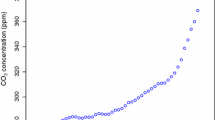Abstract
The interest shown by policy makers and economists in the precautionary principle indicates the importance of model uncertainty in global warming policy. I show that through robust control, policy makers can implement the precautionary principle to regulate a stock pollutant, and I analyze its effect on expected steady state pollution taxes, stocks and welfare. The paper is broadly comprised of a theoretical part and an application to global warming policy. I find that: (1) an increase in either uncertainty about the model or risk about abatement cost increases expected steady state pollution taxes; (2) a robust policy is preferred for any level of model uncertainty and this preference increases for either higher model uncertainty or higher multiplicative risk and (3) the effect on expected steady state pollution taxes and stock of introducing model uncertainty is relatively small for high levels of model uncertainty. These results advocate using robust policies for a stock pollutant in the presence of model uncertainty.
Similar content being viewed by others
References
Amman H and Neudecker H (1997). Numerical solution methods of the Algebraic Matrix Riccati Equations. J Econ Dynamics Control 21: 363–369
Arrow K and Fisher A (1974). Environmental preservation, uncertainty and irreversibility. Quart J Econ 88(2): 312–319
Arrow K, Hurwicz L (1972) An optimality criterion for decision-making under ignorance. In: Shackle C, Ford J (eds) Uncertainty and expectations in economics: essays in honour of G.L.S. Basil Blackwell, Oxford
Barrieu P and Sinclair-Desgagné B (2006). On precautionary policies. Manage Sci 52(8): 1145–1154
Chevé M, Congar B (2002) Managing environmental risk under scientific uncertainty and controversy. In: van Ierland EC, Weikard HP, Wesseler J (eds) Proceedings of the international conference on risk and uncertainty in environmental and resource economics, Wageningen University, Wageningen, The Netherlands, 5–7 June 2002
EPA (2000) Guideline for preparing economic analysis, Office of the Administrator, EPA-240-R-00-003, United States of America
Gilboa I and Schmeidler D (1989). Maxmin expected utility with non-unique prior. J Math Econ 18: 141–153
Gollier C (2001). Precautionary principle: the economic perspective. Econ Policy 75: 302–327
Gollier C, Jullien B and Treich N (2000). Scientific progress and irreversibility: an economic interpretation of the precautionary principle. J Public Econ 75: 229–253
Gonzalez F and Rodriguez A (2005). Robust control: a note on the response of the control to changes in the free parameter. Econ Lett 89: 294–299
Hansen L, Sargent T (2000) Wanting robustness in macroeconomics. Working paper, http://www.stanford.edu/sargent/research.html
Hansen L and Sargent T (2001a). Acknowledging misspecification in Macroeconomic Theory. Rev Econ Dynamics 4(3): 519–535
Hansen L and Sargent T (2001b). Robust control and model uncertainty. Am Econ Rev 91: 60–66
Hansen L, Sargent T (2007) Robustness. Princeton University Press
Henry C (1974). Investment decisions under irreversibility: the irreversibility effect. Am Econ Rev 64: 1006–1012
Hoel M. and Karp L (2001). Taxes versus quotas for a stock pollutant with multiplicative uncertainty. J Public Econ 82: 91–114
Immordino G (2001). Self-protection, information and the precautionary principle. Geneva Papers Risk Insurance Theory 25: 179–187
Kendrick D (1981) Stochastic control for economic models. Mc Graw Hill
Klibanoff P, Marinacci M and Mukerji S (2005). A smooth model of decision making under ambiguity. Econometrica 73: 1849–1892
Klibanoff P, Marinacci M and Rustichini F (2006). Ambiguity aversion, robustness, and the variational representation of preferences. Econometrica 74: 1447–1498
Knight F (1921) Risk, uncertainty and profit. Houghton Mifflin Company, Boston
National Oceanic and Atmospheric Administration (1999) Discounting and The Treatment of Uncertainty in Natural Resource Damage Assessment, Technical Paper 99-1, United States of America
Nordhaus W (1994) Managing the global commons: the economics of climate change. MIT Press, Cambridge
Nordhaus W, Boyer J (1999) Warming the world: economics models of global warming. MIT Press, Cambridge
Palmini D (1999). Uncertainty, risk aversion and the game theoretic foundations of the safe minimum standard: a reassessment. Ecol Econ 29: 463–472
Roseta-Palma C and Xepapadeas A (2004a). Robust control in water management. J Risk Uncertainty 29: 21–34
Roseta-Palma C, Xepapadeas A (2004b) Instabilities and robust control in fisheries, draft
Rustem B (1988). A constrained min–max algorithm for rival models. J Econ Dynamics Control 12: 101–107
Tetlow R and zur Muehlen P (2001). Robust monetary policy with misspecified models: does model uncertainty always call for attenuated policy?. J Econ Dynamics Control 25: 911–949
Treich N (2001). What is the economic meaning of the precautionary principle. Geneva Papers Risk Insurance 26: 334–345
Woodward R and Bishop R (1997). How to decide when experts disagree: uncertainty-based choice rules in environmental policy. Land Econ 73: 492–507
Author information
Authors and Affiliations
Corresponding author
Rights and permissions
About this article
Cite this article
Gonzalez, F. Precautionary Principle and Robustness for a Stock Pollutant with Multiplicative Risk. Environ Resource Econ 41, 25–46 (2008). https://doi.org/10.1007/s10640-007-9179-3
Received:
Accepted:
Published:
Issue Date:
DOI: https://doi.org/10.1007/s10640-007-9179-3
Keywords
- Global warming
- Knightian uncertainty
- Multiplicative disturbances
- Pollution control
- Precautionary principle
- Robustness
- Stochastic control




